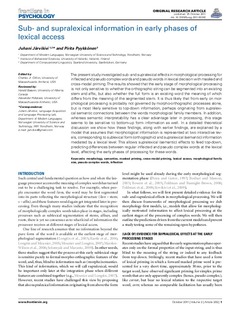Sub- and supralexical information in early phases of lexical access
Journal article, Peer reviewed
Permanent lenke
http://hdl.handle.net/11250/2393834Utgivelsesdato
2011Metadata
Vis full innførselSamlinger
Sammendrag
The present study investigated sub- and supralexical effects in morphological processing for inflected and pseudo complex words and pseudo words in lexical decision with masked and cross-modal priming. The results showed that the early stage of morphological processing is not only sensitive to whether the orthographic string can be segmented into an existing stem and affix, but also whether the full form is an existing word the meaning of which differs from the meaning of the segmented stem. It is thus likely that from early on morphological processing is probably not governed by morpho-orthographic processes alone, but is most likely sensitive to top-down information, perhaps originating from supralexical semantic connections between the words morphological family members. In addition, whereas semantic interpretability has a clear advantage later in processing, this stage seems to be sensitive to bottom-up form information as well. In a detailed theoretical discussion we show how these findings, along with earlier findings, are explained by a model that assumes that morphological information is represented at two interactive levels, corresponding to sublexical form (orthographic) and supralexical (semantic) information mediated by a lexical level. This allows supralexical (semantic) effects to feed top-down, predicting differences between regular inflected and pseudo complex words at the lexical level, affecting the early phases of processing for these words.
